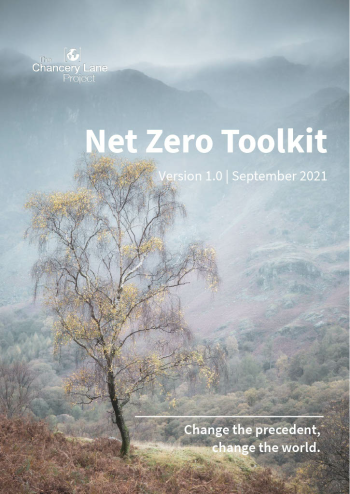Net Zero Toolkit
In preparation for COP26 in November 2021, The Chancery Lane Project (TCLP) launched a Net Zero Toolkit helping lawyers amend their contracts to meet net zero goals.
The toolkit comprises:
- 100+ climate clauses including 24 best-in-class high ambition clauses aligned with the Paris Agreement goals.
- Net zero implementation tools to help lawyers understand the concept of net zero, accurately define climate terms and know the key issues to look out for when including net zero commitments in contracts.
- Other tools including a clause timeline and net zero transition map to help lawyers choose the right climate clauses for their agreements.
TCLP’s toolkit ensures that legal agreements use the net zero concept accurately and with sufficient ambition to align with the 1.5 degree Paris Agreement goal, ensure offsetting and governance targets are robust and appropriate action plans are in place to enable the most efficient net zero transition.
TCLP’s climate clauses undergo a three stage peer review process before they are published, during which they are rigorously quality controlled and scrutinised for technical accuracy, commerciality, relevance and usability by sector specialist lawyers, expert environment lawyers, and the TCLP team.
Matthew Gingell, Chair of TCLP and General Counsel at Oxygen House Group, said: “Whether a company is in the foothills of their net zero journey, unsure of what exactly net zero is or where to start, or if they have already implemented climate-aligned clauses and are looking to be more ambitious in their net zero drafting, this toolkit is for everyone. It gives lawyers the tools they need to amend their agreements today to create the best climate outcomes as fast as possible and to lead the way in the Race to Zero.”
TCLP is a pro bono initiative that brings legal professionals together to collaborate and rewrite contracts to support communities and businesses in fighting the climate crisis and achieving net zero carbon emissions. The Chancery Lane Project is independent of any professional body or practice and is politically neutral. The clauses are the product of The Chancery Lane Project’s events, where lawyers from across the profession collaborate to draft new climate clauses. The ground-breaking initiative launched in November 2019, and now has more than 1,100 active participants, across 200 organisations.
TCLP’s clauses are free to use and available to download via this link. Google Doc and .csv versions of the documents are available via this link.
From 1 October 2021, TCLP is hosting a number of events to introduce the toolkit, followed by sector specific workshops to empower and enable lawyers to use the tools themselves. Visit the events page here to sign up.
For more information on The Chancery Lane Project or if you are a lawyer seeking to volunteer your time, please visit our website. To receive regular email updates register here.
[edit] Related articles on Designing Buildings
Featured articles and news
Restoring Great Yarmouth's Winter Gardens
Transforming one of the least sustainable constructions imaginable.
Construction Skills Mission Board launch sector drive
Newly formed government and industry collaboration set strategy for recruiting an additional 100,000 construction workers a year.
New Architects Code comes into effect in September 2025
ARB Architects Code of Conduct and Practice available with ongoing consultation regarding guidance.
Welsh Skills Body (Medr) launches ambitious plan
The new skills body brings together funding and regulation of tertiary education and research for the devolved nation.
Paul Gandy FCIOB announced as next CIOB President
Former Tilbury Douglas CEO takes helm.
UK Infrastructure: A 10 Year Strategy. In brief with reactions
With the National Infrastructure and Service Transformation Authority (NISTA).
Ebenezer Howard: inventor of the garden city. Book review.
The Grenfell Tower fire, eight years on
A time to pause and reflect as Dubai tower block fire reported just before anniversary.
Airtightness Topic Guide BSRIA TG 27/2025
Explaining the basics of airtightness, what it is, why it's important, when it's required and how it's carried out.
Construction contract awards hit lowest point of 2025
Plummeting for second consecutive month, intensifying concerns for housing and infrastructure goals.
Understanding Mental Health in the Built Environment 2025
Examining the state of mental health in construction, shedding light on levels of stress, anxiety and depression.
The benefits of engaging with insulation manufacturers
When considering ground floor constructions.
Lighting Industry endorses Blueprint for Electrification
The Lighting Industry Association fully supports the ECA Blueprint as a timely, urgent call to action.



















